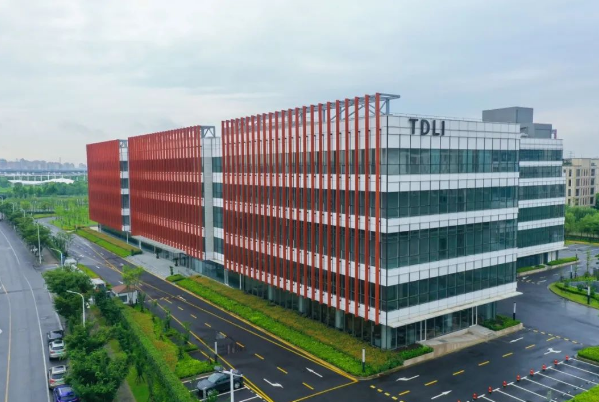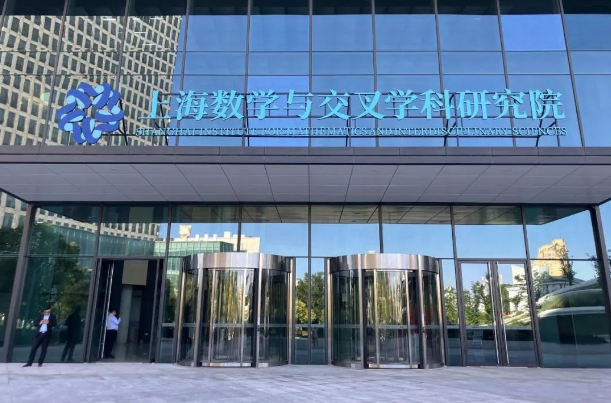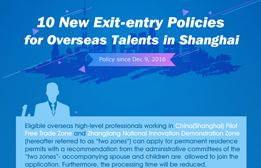Leading research institutes in Shanghai explore new frontiers
Shanghai boasts two cutting-edge research institutions: the Tsung-Dao Lee Institute (TDLI) and the Shanghai Institute of Mathematics and Interdisciplinary Sciences (SIMIS). These institutions are at the forefront of global academia, attracting top scholars to explore fundamental scientific questions.
TDLI: Exploring the vast universe

The Tsung-Dao Lee Institute. [Photo/Ke-Way]
The TDLI is a basic research institute established at Shanghai Jiao Tong University in November 2016, with the goal of becoming a world-leading science institute.
The institute focuses on the most fundamental questions of science and conducts cutting-edge research in physics and astronomy in an effort to shed light on the relationship between the maximum and the minimum in the universe, as well as explore the most fundamental and profound laws of interaction in nature.
According to Zhang Jie, academician of the Chinese Academy of Sciences and director of the TDLI, the universe is a focal point of research at the institute. Focusing on the fundamental scientific question of the origin and evolution of matter under extreme cosmic conditions, the institute has established three major research directions: astronomy and astrophysics, particle and nuclear physics, and condensed matter physics.
To develop extreme detection capabilities, the institute has set up three research platforms in Shanghai's Zhangjiang area, namely the Laboratory Astrophysics Experimental Platform, the Topological Materials Research Experimental Platform, and the Large-scale Scientific Computing Platform.
It has also initiated the layout of three advanced observation bases nationwide, including the construction of Phase II of the PandaX Dark Matter and Neutrino Detection Device at a depth of 2,400 meters in Jinping, Southwest China's Sichuan province, the construction of Phase I of the JUST Spectral Telescope at an altitude of 4,200 meters in Lenghu, Northwest China's Qinghai province, and the construction of Phase I of the TRIDENT Neutrino Telescope in the South China Sea, China's first high-energy neutrino telescope to exceed a depth of 3,500 meters.
As a highly internationalized basic scientific research institution, the TDLI has gathered over 120 full-time researchers from 18 countries and regions, including the United States, the United Kingdom, Germany, and Japan. All full-time scholars have studied or conducted research at top overseas institutions, with international scholars accounting for nearly 40 percent of the total.
"We have completed the drafting of the 'TDLI 2035 Development Plan'. The plan clarifies the scientific mission of the TDLI to make significant breakthroughs in the exploration of fundamental scientific questions by leveraging the large-scale scientific research paradigm and the extreme detection capabilities of dedicated scientific devices, in hopes of establishing a 'Shanghai School' of basic research within three five-year periods. By 2035, we aim to build a world-class basic scientific research institute with significant academic influence," said Zhang.
SIMIS: Maths for AI

The Shanghai Institute of Mathematics and Interdisciplinary Sciences. [Photo/Ke-Way]
Led by Qiu Chengtong, an eminent contemporary Chinese mathematician and the first ethnic Chinese laureate of the Fields Medal, the SIMIS focuses on original innovation and disruptive technologies. The institute's research layout includes basic mathematics, applied pure mathematics, and interdisciplinary applications.
Quantum field theory and string theory, as well as AI mathematical theory, are the focal points pursued by mathematicians worldwide and are also the research topics being advanced by the institute. Li Jun, director of the institute, explained that compared to the popular AI for science (AI-driven scientific research), the institute focuses on maths for AI (mathematics is the foundation of artificial intelligence), using mathematics to understand the mechanisms of artificial intelligence algorithms. In this research field, Qiu's team has already made a series of groundbreaking contributions.
The institute has already identified the first batch of 11 interdisciplinary projects to be funded, including the construction of a data map of miRNA biomarkers for breast cancer and their application in diagnosis and traditional Chinese medicine development, numerical wind tunnel and airport area simulation systems, modeling of complex systems in human language evolution, and network topology analysis of complex disease occurrence. The core of these projects involves manipulating and analyzing large amounts of data using mathematics.
"From obscurity to global renown, the Princeton Institute for Advanced Study took only 30 years. We are confident that we can build a world-class mathematical center in a short period of time," said Professor Hu Sen, vice dean of the institute. Since its establishment in January this year, the institute has recruited 48 scientists through rigorous peer review, with 42 of them working full-time. Most of them are around 30 years old, specializing in fields such as differential geometry, algebraic geometry, and mathematical physics.
Attracting top students to make academic breakthroughs
"The better the teacher, the better the students they produce," said Andrey Losev, a professor at the SIMIS from Russia. "Engaging in basic research is like fishing; everyone wants to catch the 'big fish', but no one can guarantee it. We can only prepare for the day when it arrives—even if we ultimately do not make significant progress, students will take over our work and continue to make breakthroughs in basic research." Losev has already commenced master's student training at the institute.
At a top research institution, students can learn and exchange ideas with "big-shot" professors and inherit the academic interests and research methods of their mentors.
In 2023, the Ministry of Education initiated the first batch of National High-level Talent Training Centers for Mathematics, Physics, Chemistry, and Biology. The National High-level Talent Training Center for Physics at Shanghai Jiao Tong University, with the TDLI as its core, is one of the three physics centers.
Leveraging an internationally top-tier faculty and the large-scale scientific research paradigm and benchmarking against leading international universities, the center aims to attract top students from domestic and international top universities to join the center's "Tsung-Dao Lee Ph.D." program, establish an elite doctoral student training system, and build an international joint training mechanism for doctoral students based on in-depth scientific research cooperation.
By 2025, the SIMIS plans to recruit 20 graduate students annually. The 2024 cohort of students is currently attending classes at the institute and participating in seminars and other academic research activities. Visiting students from home and abroad are also engaging in the institute's courses and academic activities, fostering ample academic exchange with the institute's graduate students.
To cultivate top talent in the fields of mathematics and AI, the "Elite Class" project is a joint undergraduate training program conducted by the institute and Fudan University's Mathematics Center. The project initially selects 30 Shanghai's high school students with excellent mathematical abilities. If their college entrance examination scores reach the first-tier line in Shanghai, they can be admitted to Fudan University's Xianghui Institute and transfer to the Mathematics Center for study after one year. At that time, the "Mathematics Elite Class" and the "Artificial Intelligence Elite Class" will be formed, with the former adopting a bachelor's and doctoral system and the latter adopting a bachelor's and master's system.
"Starting from July 19 this year, we will also jointly host a five-week 'Qiu Chengtong International High School Student Mathematics Summer Camp' with Fudan University. This will be the 11th time the camp has been held and the first time it will take place in Shanghai, with a large proportion of international students participating," said Professor Lian Wenhao, vice dean of the SIMIS, who was trained by Qiu 32 years ago as a postdoctoral fellow at Harvard University.
Lian explained that the summer camp will invite world-class mathematicians to give academic lectures, teaching students about the direction and achievements of modern mathematical research and encouraging them to present their research results in specialized reports during the camp. The camp will pre-select outstanding high school students for the "Elite Class", aiming to cultivate a new generation of young mathematical scientific research talent.
The SIMIS aims to train 30 to 40 young mathematicians, 100 postdoctoral researchers, and 500 graduate students within 10 years.

 Print
Print Mail
Mail




